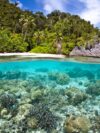
At Faunomics, our collective identity is defined by a unique blend of expertise, innovation, and a shared vision to “See the Unseen”—to unravel the complexities of Earth’s ecosystems and biodiversity through precise and data-driven methodologies. Our team’s unity is underpinned by a common purpose: to advance our understanding of the natural world and to provide actionable insights for diverse stakeholders including industries, NGOs, governments, and communities.
Michael
After studying biology with a focus on classical botany and zoology, Michael Riffel obtained his PhD with a population genetic topic on freshwater fish at Heidelberg University. In 2000, he became self-employed, founding RIFCON GmbH, which now employs around 200 scientists in the fields of environmental planning and chemical approval, and, in 2023, founded Faunomics GmbH, which offers services in the field of eDNA. Since 2014, Michael has also been running an ecotourism company in African Zambia. Nature and species conservation are close to his heart, supported financially by the establishment of the Caring for Conservation Fund gGmbH.

Sabina
Sabina graduated with a Doctorate in Natural Sciences from the University of Kaiserslautern, Germany, she holds a Bachelor’s degree in Biology with a focus on Molecular Biology. Sabina was granted the Emerging Leaders in the Americas Program scholarship, which took her to Montreal for further studies in biology. After completing her scholarship, Sabina returned to Colombia to work in molecular ecology research. She then moved to Germany to pursue a doctorate degree with BASF SE, where she specialized in the implementation of omics technologies in toxicology. She is currently a Lab Leader at Faunomics, where she applies her expertise in molecular biology and omics technologies to drive innovative research and development.
Eric
After studying Biology with a focus on Biochemistry, Molecular and Cell Biology, Eric gained his doctoral degree in the field of molecular plant biology at the University of Heidelberg. During his doctorate and subsequently as a postdoc, Eric investigated the influence of protein modifications on the abiotic stress response in plants. After successful years in basic university research, Eric moved to industry to work in quality assurance at RIFCON GmbH. After a short break from research, Eric returned to the laboratory at Faunomics, where he can utilize his broad expertise in molecular biology.
Anna
Anna is a biologist with a curiosity for how ecosystems change through time. She earned her PhD at the University of Konstanz, where she explored 15,000 years of environmental history from the sediments of Lake Constance using ancient DNA. Before that, she completed a Master’s in Biological Oceanography at the University of Kiel and a Bachelor’s in Biology at the Federal University of Goiás in Brazil.
She now works as a Scientist at Faunomics, applying her expertise in environmental DNA, molecular ecology, and bioinformatics to push biodiversity research and biomonitoring technologies forward.
Carina
Carina holds a Master of Science in Molecular Nutritional Science from the University of Hohenheim in Stuttgart, where she specialized in microbiome research and bioinformatics. During her studies, she investigated how different dietary interventions influence the composition of the gut microbiota in mice using Next Generation Sequencing (NGS) data. Through this work, she gained extensive expertise in genomics, microbial community analysis, molecular biology techniques, and the use of bioinformatic pipelines. At Faunomics, Carina works as a scientist, combining her enthusiasm for laboratory work with her strong interest in scientific data analysis.
Charlotte
Charlotte studied Biology at Heidelberg University, where she first specialized in Ecotoxicology and later completed her Master’s degree in Molecular Plant Biology. She combines her passion for nature and science to develop innovative methods for detecting and analyzing biological diversity. Having spent several months conducting fieldwork in Africa, she combines solid laboratory expertise with a practical understanding of ecological dynamics.
Currently, she is an intern at Faunomics, supporting projects on genetic biodiversity assessment. She has contributed to the sampling of bushbabies in Zambia and is involved in the development and implementation of air eDNA samplers for non-invasive species detection.
Christian
Christian completed his bachelor’s, master’s, and doctoral studies in biology at the Technical University of Darmstadt. His doctoral research focused on insect-pathogenic viruses and the genetic basis of diapause, a type of hibernation, in insect pests of fruit crops. To this end, he used a variety of techniques ranging from fieldwork to classical crossbreeding and molecular biological analyses to bioinformatics. During his PhD studies, he spent two years with a cooperation partner conducting research in South Tyrol.
Today, Christian applies his theoretical and practical knowledge in the field of environmental DNA to advance agricultural and biodiversity research.
Clara
Clara holds both a Bachelor’s and a Master’s degree in Biological Sciences from the University of Konstanz, Germany. During her Master’s research at the Limnological Institute, she focused on the metabarcoding of sedimentary environmental DNA from Lake Constance, exploring how molecular data can reveal ecological histories. Before joining Faunomics, she worked at the Institute of Forensic Medicine in Rostock, where she gained hands-on experience in forensic genetics, including STR analyses for parentage and criminal investigations.
As a Scientist and Laboratory Coordinator at Faunomics, Clara contributes her expertise in eDNA and metabarcoding to the development and coordination of molecular biodiversity projects. She is driven by a strong interest in applying molecular approaches to advance biodiversity monitoring and conservation.
Daniel
Daniel obtained his Bachelors degree in Biology with a focus on Field Ecology and Conservation in Guatemala, which is part of the Mesoamerican Biodiversity Hotspot. Daniel later obtained a Master’s degree in Ecology and Evolution with a focus on Genomics from the University of Munich. He is currently a PhD student at Faunomics where in close collaboration with Lara Urbans laboratory at the Helmholtz Pioneer Campus, Munich he is working to develop molecular and bioinformatic approaches for monitoring biodiversity using different environmental DNA sources and portable Next-Generation Sequencing (NGS) technologies. Daniel also obtained a Bachelor’s degree in Business Administration from the Technical University of Applied Sciences in Wildau, Germany.
Eva
Eva completed her training as a biotechnical assistant in Heidelberg and began her Bachelor’s degree in Biotechnology at the University of Applied Sciences in Mannheim, gaining practical experience throughout her studies, particularly during her internship semester at Faunomics. There, she developed and optimized a method for detecting fish in freshwater using eDNA analysis, a project that deepened her interest in genetics and molecular ecology and provided valuable insights into modern molecular biology techniques.
She is currently employed as a working student at Faunomics, supporting the team in various laboratory and analytical tasks, and plans to write her bachelor’s thesis at the company to further build on her practical experience.
Juan Manuel
Juan Manuel obtained his Bachelors degree in Biology where he focused on the systematics and taxonomy of small Andean marsupials in Colombia. He then worked for several years as a research scientist, participating in various biodiversity projects across Colombia. He completed his Master’s degree in Earth Sciences, studying mammal communities along elevational gradients in one of the most biodiverse areas of the world, the northwest corner of South America. His research experience includes fieldwork, molecular laboratory work, and bioinformatics. At Faunomics, Juan Manuel works on the eMoTi project, developing eDNA methods to monitor the Asian tiger mosquito (Aedes albopictus) in the Rhine plain. He applies molecular tools to support public health surveillance and biodiversity monitoring efforts.
Mariana
Mariana is currently pursuing her Bachelor’s degree in Biology and joined Faunomics for an eleven-month internship, where she gained extensive experience in molecular ecology and eDNA analysis. During her time there, she conducted an independent study focused on the identification of German bat species from fecal and oral swab samples. Before coming to Germany, she participated in laboratory and fieldwork activities in Colombia, particularly involving small mammals. After completing her internship, Mariana continues to support Faunomics remotely from Colombia through science communication, website maintenance, and visual content design, combining her scientific background with a growing interest in science communication.
Theo
After earning his Bachelor’s degree in Biology from the University of Bremen, focusing on Marine Biology, Theo went on to complete a Master’s degree in Biological Oceanography at Kiel University. Through his work on deep sea metagenomic datasets, he started to build an interest in bioinformatics and general data science. At Faunomics, he is developing bioinformatic pipelines and computational tools and working to continuously improve existing analysis methods to analyze our complex datasets in an effort to support the team in all ongoing projects.
Tom
Tom Riffel is an enthusiastic ecologist and conservationist with a strong focus on conservation work in Zambia. He completed his studies in Ecology and Conservation Science at the University of Suffolk in the UK. Currently, he co-manages a conservation NGO in eastern Zambia alongside his father. Tom’s passion for conservation and expertise in ecology make him a valuable asset to Faunomics. He brings a wealth of field-based experience, including camera trapping, bioacoustics, various survey methods, and remote sensing.
Join our journey!
Connect with Faunomics to analyze nature’s complexities and advance solutions. Contact us to take science-based action.
Commitment
The cornerstone of our team dynamic is a deep-seated commitment to both our environmental mission and to each other. This commitment is reflected in our collaborative approach to problem-solving, where challenges are met with collective resourcefulness and resilience. It is this shared dedication that ensures our work not only meets but exceeds the expectations of those we serve, driving positive and measurable environmental outcomes.

Empathy
Empathy is central to our ethos, informing our internal collaborations and our engagements with the broader community. It is through empathy that we can truly appreciate the complexity of ecological systems and the varied needs of the communities we work with. This understanding is crucial in devising solutions that are not only scientifically sound, but are also equitable and sensitive to the socio-ecological contexts in which we operate.

Relationships
The essence of Faunomics is found in the strength of our relationships—be it within our team or with our partners and clients. These relationships are the foundation for a collaborative and inclusive work environment where innovative solutions are born from the synergy of diverse expertise and perspectives. We are committed to fostering strong, constructive partnerships that are conducive to shared learning and collective action.
Our team comprises a dynamic array of professionals including scientists, analysts, and communicators, each contributing their specialized knowledge towards our common goals. More than their individual skill sets, they are the bearers of our core values, driving our efforts to illuminate the unseen aspects of the natural world and contribute to its preservation.
Faunomics is not just a collective of individuals, but a community united by a dedication to environmental stewardship. Through our shared commitment, empathy, and the nurturing of meaningful relationships, we endeavour to uncover new insights about our planet, ensuring its wonders and resources are preserved for future generations.


















